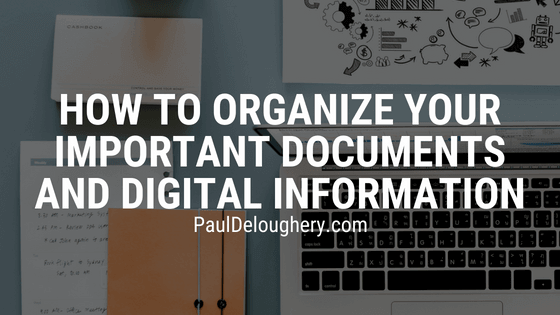
How to Organize Your Important Documents and Digital Information
Life has gotten a whole lot more complicated than it was when I was a child in the 1970’s. My parents had keys to the house, their business, and our boat. They probably had a few other random keys as well. But they didn’t have long lists of passwords to various websites and financial accounts. Also, my parents had one place that they called home, and didn’t travel like I do.
For years, I was uneasy about what to do. There are numerous companies that offer to hold your passwords. But who can you trust? We are constantly hearing about companies who’s data is breached, with passwords and key information in some stranger’s hands.
This doesn’t seem shocking to me. Prior to focusing my practice on asset protection, I practiced probate litigation. I can rattle off a string of cases involving romances between younger women and older men. However, I can’t recall a single case involving the reverse (of an older woman and a younger man).
In my experience, the romance typically begins when a female caretaker or a next-door-neighbor starts to help out an older male bachelor. Older men are often lonely and crave the extra attention (especially from an attractive younger lady friend). So, it seems like a perfect fit. Except that they aren’t the only people interested in the outcome of this scenario. The man often has children from an earlier marriage. And they expect to inherit their father’s money.
This makes for strange dynamics. The romance is sometimes concealed from the other family members, to avoid any conflict. Otherwise, the romantic relationship with the younger lady strains the man’s relationship with his kids. The kids can become estranged to their father. Even though he loves his children, he also wants romance.
Amid all of this, the man often changes his estate planning documents to give some or all his wealth to his caretaker-lover. If the kids find out about this during their dad’s lifetime, one of them can go to court and seek to be appointed to make personal and financial decisions for him. The father may fight this, because he wants to have a girlfriend.
Alternatively, the fight might not happen until after the father has died. Suddenly the kids sue the girlfriend, claiming that she pressured their dad to change his estate documents, so she could inherit from him.
Either way, all sides can end up spending fortunes in legal fees fighting each other. The saddest scenario is when this happens during the father’s lifetime, and the lawyers end up eating through the bulk of his wealth in the course of litigation.
The solution is not to simply have updated estate planning documents. This may help ensure success during a court battle. But it does not actually prevent the court battle.
Doing nothing ain’t the answer.
If you do nothing, all that will happen is your life will continue to get more complicated. And this poses various risks. For example, what happens if you die or become incapacitated? How will anyone know how to access your accounts and other information?
Here’s what I tell my clients:
- First, choose a place to store your passwords. I tell my clients to use LastPass or 1Password.
- Second, write down the password to your LastPass (or 1Password) account and put it in a secure place. For example, you might put your LastPass password in a portable lockbox. The key to that lockbox is on your keychain. Tell your spouse about this. If you own a business, tell your assistants at work about this as well. If anything should happen to you, they know to open the lockbox and get access to your LastPass account.
- Third, choose a place to store copies of documents and other information. One company I suggest is EverPlans. (Though there are other companies available.) Upload copies of your estate plan documents, passport, driver’s license, and other information to the secure website.
- Fourth, store your original estate plan documents somewhere safe. This might be a file cabinet in your house or at your office. The one risk with this is that someone can take and destroy documents that they don’t like. However, this is mitigated because you have copies in your EverPlans account.
Why have two accounts for storing information? Because they serve two purposes. With LastPass, when you sign into a website on a computer, the LastPass app will ask if you want to store the login information. This does not currently work from mobile devices. But you can always manually enter the information.
EverPlans, on the other hand, is for storing copies of documents and photographs of things like your passport and driver’s license. You can also store passwords here. But it doesn’t automatically sense when you sign into a website and ask if you want to store the login credentials like LastPass does.
What NOT to do:
Do no put your original estate plan documents in a bank safe deposit box. Safe deposit boxes are difficult to access if you are not available. Banks may not grant access to the person named in your documents, even if that person has a key.
Search
Recant Post
-
The Art of Letting Go Gracefully – Family Office Succession Planning Explained
-
Top 7 Causes of Family Conflicts and How to Resolve Them Before They Ruin Everything
-
Marriage Conflict? Here's How to Resolve Disputes Peacefully
-
Mother vs. Son? Here's How to Resolve Conflicts Peacefully
-
Don't Lose Your Loot – Smart Strategies for Protecting and Preserving Wealth
